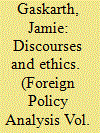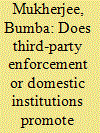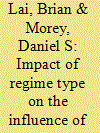| Srl | Item |
| 1 |
ID:
074653


|
|
|
|
|
| Publication |
2006.
|
| Summary/Abstract |
The last decade has given rise to a wealth of literature on the ethics of British foreign policy. However, much of this has focused on a few narrow issues based around specific policy actions. As such, it has largely been reactive and mirrored governmental attitudes to the possibilities in foreign policy and the constraints under which decisions are made. Important issues, such as how the concepts of foreign policy and ethics have been described and enacted historically in Britain, the political effects of these past readings, and how the idea of discussing ethics should be so controversial, are underexplored. To investigate these naturalized understandings, this article conducts a discourse analysis of the articulation of foreign policy in Hansard over the last century. In doing so, it seeks to explore how past expressions of foreign policy and ethics privilege certain ways of thinking about policy and exclude others through their modes of description. The effect of these structures, it is argued, is to suppress democratic dissent and individual accountability and marginalize discussion on the (contestable) ethical basis of policy making and policy behavior.
|
|
|
|
|
|
|
|
|
|
|
|
|
|
|
|
| 2 |
ID:
074658


|
|
|
|
|
| Publication |
2006.
|
| Summary/Abstract |
What causes peaceful resolution of civil wars to endure rather than to collapse into renewed fighting? Existing studies predict that third-party peace enforcement by the United Nations (UN) or domestic institutions such as democracy, parliamentary, and presidential institutions and the proportional representation (PR) electoral system promotes enduring peace in societies that have emerged from a civil war. However, extant empirical works test the effect of third-party enforcement but not the impact of domestic institutions on peace after civil wars. Hence, I test the impact of democracy, presidential, and parliamentary institutions, electoral systems-PR and majoritarian-and third-party enforcement by the UN on the durability of peace after termination of civil wars. Results from a bootstrapped Weibull duration model show that democracy and the PR electoral system significantly reduces the likelihood that civil war may recur, but that third-party enforcement by the UN does not have a significant effect on the hazard rate of peace spells. A brief case study analysis of recent attempts to build democratic institutions in Cambodia and Kosovo by the international community also supports the claims posited in this article.
|
|
|
|
|
|
|
|
|
|
|
|
|
|
|
|
| 3 |
ID:
074656


|
|
|
|
|
| Publication |
2006.
|
| Summary/Abstract |
Past studies of U.S. foreign aid and UN voting have not taken into account the different incentives of leaders based on regime type. Democratic and nondemocratic leaders use different means to remain in power, conditioning their response to foreign aid. Nondemocratic leaders can use foreign aid to provide private goods to elites ensuring continued support or to improve their coercive capabilities to maintain power. Democratic leaders can use neither of these tools, as their tenure requires mass support. This means nondemocracies are more likely than democracies to change their voting behavior in the UN to match donor preferences. Controlling for the influence of regime type allows us to test for when foreign aid is an effective tool of state policy. We find that nondemocratic state leaders respond to increased foreign aid by voting with the U.S. in the UN, whereas democratic leaders are nonresponsive to foreign aid.
|
|
|
|
|
|
|
|
|
|
|
|
|
|
|
|
| 4 |
ID:
074655


|
|
|
|
|
| Publication |
2006.
|
| Summary/Abstract |
Attempts to reconstruct weak and failed countries suffer from a nirvana fallacy. Where central governments are absent or dysfunctional, it is assumed that reconstruction efforts by foreign governments generate a preferable outcome. This assumption overlooks (1) the possibility that foreign government interventions can fail, (2) the possibility that reconstruction efforts can do more harm than good, and (3) the possibility that indigenous governance mechanisms may evolve that are more effective than those imposed by military occupiers. It is argued that reconstruction efforts focus on resolving the meta-level game of creating self-sustaining liberal democratic institutions while neglecting the nested games embedded within the general meta-game. An analysis of Somalia, a prototypical failed state, is provided to illuminate these claims. While Somalia lacks a central government, the private sector has developed coping mechanisms to fill the void. These mechanisms have proven to be more effective in generating widespread order than attempts by foreign occupiers to impose a self-sustaining liberal state.
|
|
|
|
|
|
|
|
|
|
|
|
|
|
|
|
| 5 |
ID:
074652


|
|
|
|
|
| Publication |
2006.
|
| Summary/Abstract |
Recent literature argues that economic sanction threats should be more successful because both sender and target have an incentive to resolve their dispute before entering into costly sanction. Testing this assertion is somewhat problematic because threats are essentially nonevents-sanctions that were never deployed. This paper quantifies the U.S. threats to condition or revoke China's most favored nation status and shows that Washington's threats were not only ineffective but also counterproductive-Chinese accommodations decreased when the U.S. made acute threats but increased when Washington was cooperative. We conclude that for highly salient issues, sanction threats tend to be ineffective.
|
|
|
|
|
|
|
|
|
|
|
|
|
|
|
|